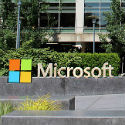Although Metaswitch reported revenues of just $180 million in 2019, the company is viewed as a knowledgeable vendor of deep networking services, which signals Microsoft's ambitions in the space.

If Microsoft's acquisition of Affirmed Networks – rumored to be $1.35 billion – wasn't enough, then its agreement to buy Metaswitch Networks, announced on Thursday, ought to make it crystal clear: Microsoft is serious about selling telecom services.
According to several people familiar with the company's plans, it appears that Microsoft is positioning its Azure cloud to run telecom and networking services for any customer, whether that customer is a telecom company or a manufacturing outfit.
"What Microsoft wants to enable is a brave new world of new operators," explained analyst Caroline Chappell with research and consulting firm Analysys Mason. She said that, with the combined acquisitions of Affirmed and Metaswitch, Microsoft appears to be positioning Azure to be able to power Network Functions Virtualization (NFV) services for virtually any customer, either inside or outside the network operator industry. "This is Microsoft enabling that (network) democratization," she said.
Microsoft has been making that strategy increasingly clear as it discusses the intersection of 5G, edge computing and private wireless networking and how Azure can enable all three. And Metaswitch plays into that: Just six months ago, Metaswitch demonstrated its Fusion Core on Azure for a private LTE network for a manufacturing company.
"The convergence of cloud and communication networks presents a unique opportunity for Microsoft to serve operators globally via continued investment in Azure, adding additional depth to our hyperscale cloud infrastructure with the specialized software required to run virtualized communication functions, applications and networks," wrote Microsoft's Yousef Khalidi (who also announced the company's Affirmed purchase) on the company's website.
Microsoft confirmed to Light Reading that Jason Zander, EVP of Azure, would oversee both Affirmed and Metaswitch. But the company declined to offer any more concrete details about its overall plans, as well as how much it paid for Metaswitch.
Small but respected
Microsoft's latest acquisition in the networking space will provide it with deep networking and software knowhow at what is likely a relatively cheap price. The roughly 800 employees of Metaswitch – a company founded in 1981 – have been widely praised as experts in the guts of telecom networks, having successfully managed to separate a number of complex software functions from hardware operations over the past decade or so. Some of the company's more recent efforts have involved virtualized IMS core networks and wireless/wireline convergence in 5G.
"It's a fantastic company for them to buy, it's a fantastic team," Heavy Reading principal analyst Gabriel Brown said of Metaswitch.
However, Metaswitch was never able to propel itself into the big time, despite at least a couple of attempts to go public. The company wasn't a hypergrowth story. Metaswitch's 2019 financial report shows annual revenue of $180 million, up 2.5% from the prior year and also up from the $141 million it hauled in during 2015. However, the company counts a diverse range of stable customers, mostly in North American, alongside adjusted operating profit in 2019 of $31.4 million.
Given Metaswitch's financial performance, it's unlikely Microsoft doled out the same kind of money it paid to acquire Affirmed. But taken together, Affirmed and Metaswitch position Microsoft to cash in on a cloud-native telecommunications future.
"The two companies combined together is a really big signal that they [Microsoft] are serious about telco networking on Azure," Heavy Reading's Brown said.
Azure vs. Google
So how do these acquisitions position Microsoft in the wider market? Chappell explained that Microsoft trails Google in terms of its ability to sell networking for cloud services, but that it's ahead of Amazon AWS in the space. She said IBM, via its acquisition of Red Hat, and China's Huawei are the other major companies also playing in this sector.
"The public cloud stacks are going to be the way forward for the operators," Chappell said, explaining that operators have largely failed to build their own network clouds and have since turned to their vendors to construct such offerings. However, that has led to in-fighting among vendors, who are often unwilling to put their VNFs on other vendor's clouds.
That is creating headaches for operators because, as Chappell explained, 5G is essentially an app that needs to run on a cloud platform. "They are all looking at what their [cloud] strategy should be," Chappell said of operators.
Clearly, based on its acquisitions of Metaswitch and Affirmed, Microsoft wants to be able to supply that cloud.
— Mike Dano, Editorial Director, 5G & Mobile Strategies, Light Reading | @mikeddano
About the Author(s)
You May Also Like











